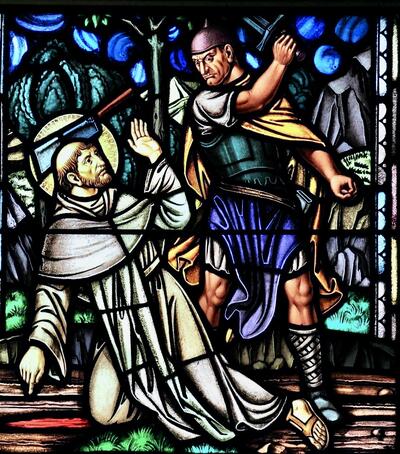The Last Words of St. Peter
St. Peter of Verona
June 4
Our final words and actions make an impression on others, and a saint who writes his last preaching with his own blood is impossible to forget. St. Peter of Verona (1205–52), an early Dominican saint and the first Dominican martyr, will forever be remembered for preaching with courage and conviction until his final breaths.
Peter’s parents believed in the Cathar or Albigensian heresy that St. Dominic first founded the Order of Preachers to combat. As dualists, Cathars believed that the material world and everything related to creation were fundamentally evil and created by an evil god, while spiritual realities were good and created by a god who was good. They also rejected the Incarnation and taught that Jesus was a purely spiritual being.
Given his family background, it would have been understandable if Peter had remained a Cathar. Since there were no Cathar teachers in Verona, however, his family sent him to be educated by Dominicans and assumed familial influence would shield him from Catholic doctrine.
Instead, St. Peter found the teaching of the Dominicans completely compelling and he entered the Order of Preachers in 1221, dedicating his life to preaching the truth of the Catholic faith and refuting the beliefs his family had tried to instill in him. In time, news of Peter’s preaching spread, and his responsibilities within Dominican communities and from papal assignments increased. As Peter traveled and grew in influence, many Cathars came back into communion with the Church.
In the final months of his life, animosity from the Cathars intensified, and Peter realized that he was likely in danger of assassination/martyrdom. In a vivid story (possibly a legend) passed down through the centuries, we learn that an assassin snuck up behind St. Peter and a companion as they traveled between towns. He struck Peter’s head with an axe, and Peter fell to the ground.* In his final moments of lucidity, St. Peter is said to have prayed the beginning of the Apostle’s Creed and then dipped his fingers into his wound.
With the blood, he wrote on the ground, “Credo in Unum Deum” ("I believe in one God”), the first line of the Apostle’s Creed, before succumbing to his wounds and dying a few days later. This utterly fundamental belief in the one God who created the world out of a desire to share love and goodness was St. Peter’s final act of preaching. Even as he lay dying, he did so trying to draw others to a vision of God who creates out of love, and a material world redeemed by Christ.
St. Thomas Aquinas wrote this poem in 1263 after visiting St. Peter of Verona’s tomb:
Here silent is Christ's Herald;
Here quenched, the People's Light;
Here lies the martyred Champion
Who fought Faith's holy fight.
The Voice the sheep heard gladly,
The light they loved to see
He fell beneath the weapons
Of graceless Cathari.
The Saviour crowns His Soldier;
His praise, the people psalm.
The Faith he kept adorns him
With martyr's fadeless palm.
His praise new marvels utter,
New light he spreads abroad
And now the whole wide city
Knows well the path to God.
“And now the whole wide city knows well the path to God.” The world will never forget the last words of St. Peter of Verona.
St. Peter of Verona, pray for us.
*The hired assassin, Carino of Balsamo, later became a Dominican friar. After the murder, he underwent a profound conversion and entered a Dominican monastery as a lay brother. Carino spent the rest of his life in penance and prayer, and he died with a reputation for holiness. Today, he is venerated as Blessed Carino.
Hope Zelmer
Hope Zelmer is a writer and a former theology teacher and campus minister at Fenwick High School, a Dominican Catholic preparatory school in Oak Park, Illinois. Hope has written for publications such as FaithND, Church Life Journal, and FemCatholic. She holds a BA and MA in Theology from the University of Notre Dame.


